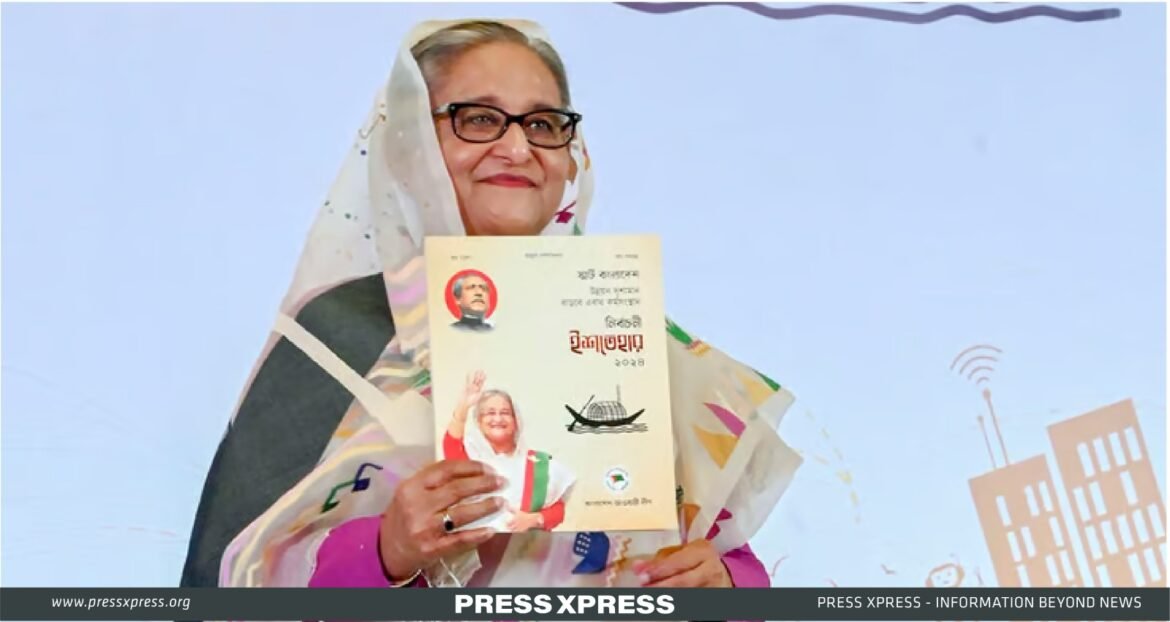The Awami League (AL) has proposed the manifesto for the upcoming election on December 27. The ruling party has been taking various steps to prepare for the election on January 7, 2024.
The AL, in preparation for the 12th parliamentary election recently conducted training for its leaders and activists in Jamalpur district (the last one to be trained) as part of the ‘Road to Smart Bangladesh Campaign.’ A total of 564 individuals participated in the training, aiming to boost voter turnout, with each participant assigned the responsibility of bringing 200 voters to polling stations.
You can also read: What to Expect from Awami League’s Manifesto 2024?
This training initiative is part of a broader effort by the ruling party, which has already trained 202,580 activists in 118 constituencies nationwide. The strategy includes allowing party leaders to contest elections independently and addressing the challenge of low voter turnout.
To address the voter turnout issue, the AL is relying on trained campaigners, each tasked with bringing voters to polling stations. The training focuses not only on mobilizing voters but also on conveying the government’s developmental achievements and plans to inspire voters to cast their ballots.
In addition to traditional campaign strategies, the AL has adopted modern methods, such as a mobile app containing voters’ details for campaigners and a central call center to provide information to activists nationwide. The party had initially set a goal of training 600,000 campaigners, but as of December 26, 202,580 campaigners have been trained.
The training operation has faced challenges, with a slowdown in sessions due to time constraints. Nevertheless, the party plans to provide various forms of assistance to campaigners, including battery-run three-wheelers on election day. Despite concerns raised by political analysts about the strategy’s effectiveness and potential intimidation, the party remains focused on ensuring a higher voter turnout through trained activists.

Road to Smart Bangladesh campaign
As Bangladesh prepares for its 12th National Assembly election on January 7, the ruling AL is shaping its election manifesto with a focus on transforming the country into a ‘Smart Bangladesh’ through digital advancements and innovative policies. The party, which previously aimed to build a ‘Digital Bangladesh’ in 2008, is now expanding its vision to introduce the concept of a ‘Smart Bangladesh’ within 2041.
The manifesto, set to be released on December 27, emphasizes five key issues:
- technology adoption
- self-sufficiency in agriculture
- youth employment
- attracting investments
- industrial growth
The manifesto also introduces the establishment of
- Smart Citizen
- Smart Society
- Smart Economy
- Smart Government
The inclusive approach in crafting the manifesto involves feedback from various segments of society, reflecting a commitment to understanding diverse needs. The overarching theme is ‘Smart Bangladesh’ which emphasizes the use of technology for national progress, encompassing good governance, environmental protection, and solutions for the energy crisis.
The manifesto addresses global economic challenges and outlines strategies for developmental goals, with a strong emphasis on youth employment and genuine state services for both urban and rural populations. The ‘Smart Bangladesh’ initiative is presented as a comprehensive strategy, incorporating governance, rule of law, and environmental protection.
The AL, in power for the last 15 years, aims for continuous development and socio-economic advancements. With a focus on creating employment opportunities for the youth in the upcoming election, Prime Minister Sheikh Hasina, also the AL President, underscores the importance of building a ‘Smart Bangladesh.’ The party’s commitment is evident in its vision for a workforce suitable for the fourth industrial revolution, with clear programs across sectors such as agriculture, education, information technology, and power generation.
The manifesto envisions a cashless, circular, entrepreneurial, knowledge-based, research-driven economy, reflecting a comprehensive understanding of the challenges faced by the population. As the election date approaches, the Awami League’s manifesto demonstrates its commitment to inclusive development, technological innovation, and economic resilience, envisioning a future where Bangladesh emerges as a smart and self-sufficient nation in the digital era.
Bangladesh’s Journey to a Smart Nation Lauded
From digital infrastructure to innovative solutions, Bangladesh is transforming into a smart nation, paving the way for a brighter and more connected future. Sajeeb Wazed Joy was the first person to put the idea of the ‘Smart Bangladesh’.

As Bangladesh strides towards becoming a smart nation, the integration of technology is not just a matter of convenience but a necessity for sustainable growth. The government’s commitment to digital infrastructure, smart urban planning, and innovation across sectors is positioning Bangladesh as a leader in the South Asian region. The journey to a smart Bangladesh is a testament to the nation’s resilience, adaptability, and vision for a technologically advanced and inclusive future.
Challenge Smart Bangladesh may face
Bangladesh embarked on the path to a technology-driven economy in 2008 with the introduction of Prime Minister Sheikh Hasina’s ‘Digital Bangladesh’ vision, outlined as a manifesto before parliamentary elections.
As the nation aspires to transition into a ‘Smart Bangladesh,’ a significant concern arises regarding the fate of the extensive workforce engaged in sectors slated for technological transformation. The impending shift raises apprehensions about job losses, particularly in white-collar professions. To address this issue, let’s delve into potential solutions by consulting experts in the field.


